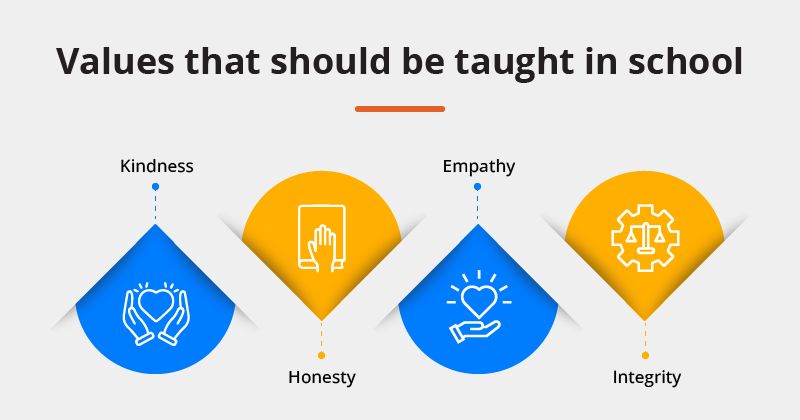How Values in Education Will Shape the Next Generation of Students

For the well-rounded development of a child, the importance of education goes beyond just academic knowledge. While subjects like mathematics, science and literature are undeniably crucial, they represent only a fraction of what a holistic education should provide. Today, both teachers and parents alike are increasingly recognizing the necessity of nurturing values like empathy, kindness, honesty, and integrity in students. These values are the building blocks of a well-rounded individual who not only excels academically but also makes meaningful contributions to society. Let’s explore the profound impact of adding values to our curriculum, and understand not only why values matter but also how to seamlessly weave them into the curriculum.
The Need for Values in Education

Values are the moral compass by which we navigate the complexities of life. They are the principles and beliefs that guide our behaviours, shape our character, and influence our decisions. Values are the foundation upon which our individuality is built, defining who we are as human beings.
Today, the traditional model of education, which primarily focuses on delivering knowledge, has given way to a more comprehensive approach. In today’s interconnected world, students face diverse cultures, opinions, and challenges daily. Consequently, they require more than just academic proficiency to thrive. They need a moral compass to navigate the ethical dilemmas and complexities they encounter.
In a society marked by rapid change and increased interconnectedness, values like empathy, kindness, honesty, and integrity are not just desirable but necessary. Empathy enables students to understand and connect with people from different backgrounds, fostering a sense of unity and compassion. Kindness nurtures a community where individuals treat each other with respect and consideration. Honesty and integrity build the trust upon which all healthy relationships, whether personal or professional, depend.
These values provide students with the tools to not only succeed but also to contribute positively to the world around them and build healthy relationships with the people around them. In essence, values are the bedrock upon which a just, compassionate, and harmonious society can be built.
Integrating Values into the Curriculum
To effectively instill values in students, they must become an integral part of the curriculum. Schools and educational institutions must recognize that values-based education is not an optional add-on but a fundamental pillar of a well-rounded education.
This leads to a question – How can educators infuse values into various subjects and lessons? The process begins with intention and creativity. Teachers have a pivotal role in this endeavour, as they can weave values into the fabric of education through real-life examples, open discussions, and ethical dilemmas.
For instance, when teaching history, educators can delve into the consequences of actions driven by kindness or cruelty, allowing students to understand the impact of historical events on people’s lives. In literature, students can explore the defining traits of each character and explore the values behind each of their actions. In science, they can explore the ethical considerations surrounding certain experiments, fostering a sense of responsibility and ethics.
Methodologies for Integrating Values into Education
Value education takes place through both direct and indirect methods, influencing students through both implicit or hidden curriculum and planned curriculum. Below are streamlined methodologies for integrating values into education:
1. Classroom Learning Activities
This strategy applies to various educational sources, including biographies, stories, literary texts, parables, proverbs, quotations and poems.
2. Practical Activities
Hands-on experiences enable students to put values into practice. These include community projects, awareness campaigns, mindfulness practices, and student-led initiatives.
3. Socialised Techniques and Activities
Group-oriented techniques enhance values education through dramas and plays, role-playing, and presenting students with role models that exemplify values.
4. Incidental Learning
This method reinforces values by recognizing right or wrong actions in real-life incidents and responding with acknowledgement, rewards, or addressing and reprimanding negative behaviour.
Assessing Value Integration
One crucial aspect of integrating values into the curriculum is assessing how effectively students are internalising them. Assessment tools and metrics can help educators gauge the impact of their efforts. Regular assessments ensure that values are not merely discussed but are genuinely shaping students’ behaviours and choices.
Assessment methods can vary widely. Surveys can provide insights into students’ perspectives on values. Self-reflection exercises encourage students to evaluate their actions and decisions in light of the values they are learning. Peer evaluations allow students to assess their peers’ adherence to values, promoting accountability and mutual support.
By incorporating values assessment into the curriculum, educators can ensure that values-based education is a continuous and evolving process, not just a one-time initiative.
The Power of Experiential Learning
While values can certainly be taught in the classroom, they are best learned through real-world experiences. Experiential learning through projects is a powerful tool to instill values in students. These projects provide opportunities for students to apply their knowledge and values in practical situations, fostering a more profound understanding.
Experiential learning projects create a bridge between theory and practice, allowing students to witness the real-world impact of their actions. This first-hand experience makes values not just abstract concepts but tangible principles that influence their everyday choices.
Project Ideas for Developing Values
There are a myriad of creative and impactful ways to promote values through projects. These go beyond the classroom and into the community, providing students with opportunities to make a meaningful difference. They not only serve as a platform for values-based learning but also empower students to make a positive impact on their communities and the world at large. They provide a sense of purpose and fulfilment, reinforcing the importance of values in their lives.
Here are a few examples:
1. Collection Drives: Initiating collection drives for essential items like food, clothing, or school supplies for the less fortunate teaches students empathy and kindness. These projects help students understand the significance of giving back to their community and helping those in need.
2. Volunteering: Encouraging students to volunteer at local organisations, shelters, or community events provides them with first-hand experiences of the impact their actions can have on others. This nurtures empathy and a sense of responsibility.
3. Environmental Projects: Projects focused on environmental conservation and sustainability instill values such as responsibility and stewardship for the planet. Students can engage in activities like tree plantation, clean-up drives, or campaigns to reduce plastic waste.
4. Cultural Exchange Programs: Organising cultural exchange programs exposes students to diverse perspectives and cultures, fostering an understanding of global interconnectedness and promoting empathy and respect for differences.
5. Ethical Business Ventures: Encouraging students to start small ethical businesses or social enterprises can teach them valuable lessons about honesty, integrity, and responsible entrepreneurship.
6. Peer Mentorship Programs: Creating peer mentorship programs within schools promotes a sense of community and responsibility. Older students can mentor younger ones, imparting values like kindness, empathy, and leadership.
Encouraging Student Participation
To maximise the impact of value-centric projects, it’s crucial to motivate and inspire students to actively participate. The role of educators, parents, and the community is instrumental in supporting and encouraging student initiatives. Educators can motivate students by setting an example through their own actions. When teachers model values like kindness, respect, and integrity, students are more likely to emulate these behaviours.
Parents can play an active role by reinforcing values at home and encouraging their children’s involvement in value-centric projects. Open discussions about the importance of values in everyday life can reinforce the lessons learned at school. The community also plays a vital part in supporting student initiatives. Local businesses, non-profit organisations, and community leaders can collaborate with schools to provide resources, mentorship, and opportunities for students to implement their projects.
Moreover, recognising and celebrating the achievements of students in value-centric projects can boost their motivation and self-esteem. This recognition can make students feel that their efforts are valued and that they are making a real difference.
In a world where knowledge is readily accessible, what sets individuals apart are their values. Integrating values into education is not just an option; it’s a necessity. Values are the cornerstones of a better society. Infusing values into the curriculum and engaging students in value-centric projects helps raise well-rounded individuals who not only excel academically but also contribute positively to their communities and the world at large. However, making changes in your curriculum can be tough to navigate. By using platforms like Extramarks Smart Class Plus, teachers may find it easier to navigate the challenges of searching for teaching resources, engaging their students, conducting assessments and more. This can help them focus on more essential areas like teaching. Take a look.
Last Updated on June 3, 2024









